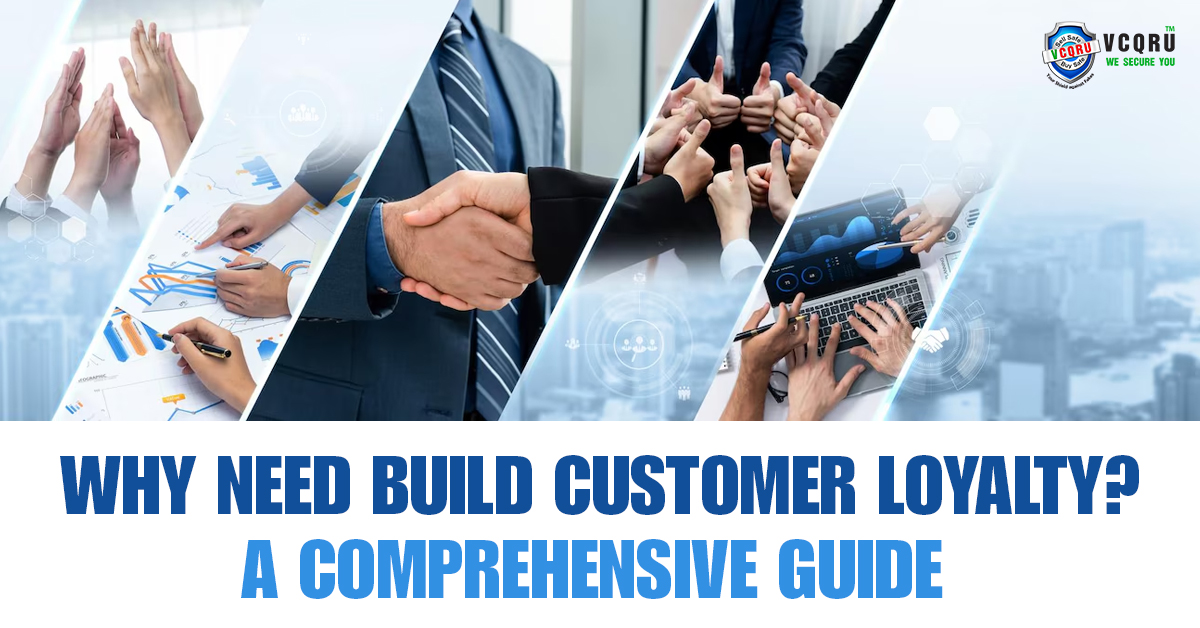

In a competitive market, maintaining a loyal customer base is more critical than ever. For any industry building and maintaining customer loyalty is paramount for long-term sustainable success. Building Customer loyalty forms the cornerstone of a successful business strategy, providing numerous benefits that extend far beyond just repeat purchases. It's about cultivating long-term relationships based on trust, satisfaction, and mutual benefit. In this comprehensive guide, we delve into the critical reasons why building customer loyalty is not just beneficial but imperative for businesses across industries.
Customer loyalty directly impacts the lifetime value of each customer. By nurturing loyalty, businesses can significantly extend the duration of customer relationships, leading to increased revenue over time. Loyal customers are more likely to make repeat purchases, engage with additional products or services, and even advocate for the brand within their social circles.
Loyal customers not only continue to support a brand but also become its ambassadors. Not only do loyal customers make repeat purchases, they also become brand advocates, spreading positive word of mouth and attracting new customers. They share their positive experiences with friends, family, and social networks, thereby enhancing the brand's reputation and credibility. A strong reputation for customer satisfaction and loyalty can attract new customers and reinforce loyalty among existing ones.
Acquiring new customers typically costs significantly more than retaining existing ones because it requires significant investments in marketing and promotional activities for acquiring a new customer. Building customer loyalty reduces the need for extensive marketing efforts aimed at attracting new clientele. Moreover, loyal customers often act as brand advocates, spreading positive word-of-mouth and driving organic growth at a fraction of the cost of traditional advertising. Resulting in lower customer acquisition costs (CAC) and higher returns on marketing investments (ROMI).
In today's hyper-competitive marketplaces, businesses face constant pressure from competitors vying for the same pool of customers. Building strong customer loyalty creates a buffer against competitive threats by fostering deeper connections with consumers. Loyal customers are less likely to defect to rival brands solely based on price or promotional offers, as their purchasing decisions are influenced by factors beyond mere transactional value.
Loyal customers are often more willing to provide valuable feedback and insights that can drive business improvement and innovation. This feedback loop is invaluable for businesses seeking to improve their products or services continually. By actively listening to and acting upon customer feedback, businesses can enhance their offerings, leading to higher customer satisfaction and, consequently, increased loyalty.
A loyal customer base provides a degree of stability and predictability to a business's revenue stream. Loyal customers not only make repeat purchases but they also spend more over time. By prioritizing customer satisfaction and loyalty, businesses can establish themselves as trusted partners in the market fluctuations, securing their position for the long term
Loyal customers are not just passive consumers; they often become vocal advocates for the brands they love. Through positive word-of-mouth recommendations, social media endorsements, and online reviews, loyal customers play a pivotal role in shaping brand perception and reputation. Leveraging the advocacy of loyal customers can amplify marketing efforts and enhance brand credibility, ultimately attracting new customers and further strengthening loyalty.
One of the most compelling reasons to build customer loyalty is its direct impact on revenue growth. Loyal customers tend to spend more over their lifetime, as they are less price-sensitive and more inclined to purchase additional products or services. Moreover, loyal customers are more likely to recommend the brand to others, leading to increased sales and a higher customer lifetime value (CLV).
Loyal customers appreciate personalized experiences tailored to their preferences and needs. By leveraging customer data and analytics, businesses can segment their audience and deliver targeted marketing messages, product recommendations, and service offerings. Personalization fosters a sense of exclusivity and relevance, deepening customer engagement and loyalty.
In today’s crowded marketplace, where product offerings are often the same, customer experience and loyalty are key differentiators. Businesses that prioritize building strong relationships with their customers gain a competitive edge by fostering trust and loyalty. This not only helps in retaining existing customers but also makes it harder for competitors to lure them away.
Loyal customers are more receptive to upsell and cross-sell efforts. Since they already trust the brand and are familiar with its offerings, they are more likely to explore additional products or services. By leveraging customer loyalty, businesses can increase their average order value and drive incremental revenue growth.
Customer loyalty manifests in various forms, each representing a different level of commitment and engagement from customers. Here are types of customer loyalty:
This type of loyalty is characterized by repeat purchases and consistent engagement with a brand's products or services. These customers continue to buy from a company out of habit or convenience, often without actively considering alternatives. They may not necessarily have a strong emotional attachment to the brand but continue to support it due to satisfaction with the product or service offerings.
Attitudinal loyalty refers to the emotional connection and positive sentiments that customers have towards a brand. These customers are not only satisfied with the products or services they receive but also feel a sense of affinity, trust, and loyalty towards the brand. Attitudinal loyalty is measured through customer satisfaction surveys, Net Promoter Score (NPS), and brand sentiment analysis
Active loyalty describes customers who actively advocate for and promote a brand to others. These customers go beyond making purchases; they engage with the brand on social media, participate in loyalty programs, write positive reviews, and refer friends and family. Active loyalty is a powerful force for brand growth, as these loyal advocates can influence others and contribute to organic customer acquisition.
Transactional loyalty is based on incentives or rewards offered by the brand in exchange for repeat purchases or engagement. Customers exhibiting transactional loyalty may participate in loyalty programs, accumulate points or rewards, and redeem them for discounts, freebies, or exclusive perks. While this type of loyalty incentivizes repeat business, it may not always result in a deep emotional connection or long-term commitment to the brand beyond the rewards program.
Cognitive loyalty refers to a rational or practical commitment to a brand based on perceived value, trust, reliability, and preference for its products or services over competitors. Customers displaying cognitive loyalty believe that the brand consistently delivers superior quality, reliability, or value proposition compared to competitors. They may weigh factors such as price, product features, customer service, and reputation when making purchasing decisions, and they remain loyal to the brand as long as it continues to meet their expectation
Understanding these different types of customer build loyalty allows businesses to tailor their strategies and initiatives to effectively nurture and strengthen relationships with customers across various dimensions. By recognizing the diverse motivations and behaviors driving loyalty, businesses can develop targeted approaches to engage customers, build trust, and create lasting connections that drive sustainable growth and success.
For Businesses, Maintaining and Building customer loyalty is an ongoing process that requires consistent effort and dedication. Here are several strategies that businesses can implement to foster and sustain customer loyalty:
Delivering exceptional customer service is paramount to building and maintaining loyalty. Train your employees to be attentive, empathetic, and responsive to customer needs. Respond promptly to customer inquiries, address concerns or issues with empathy and professionalism, and strive to exceed customer expectations at every touchpoint.
Get to know your customers individually and personalize their experiences whenever possible. Use customer data and insights to tailor communication, recommendations, and offers based on their preferences, behaviors, and purchase history.
Be honest and transparent in your dealings with customers. Build trust by delivering on your promises, honoring warranties and guarantees, and admitting mistakes when they occur. Trustworthy businesses are more likely to earn the loyalty of their customers
Reward loyal customers with exclusive benefits, rewards, or incentives to show appreciation for their continued support. Offer incentives such as discounts, exclusive offers, freebies, VIP treatment, or loyalty points for every purchase. Recognize and appreciate loyal customers by sending personalized thank-you notes, birthday or anniversary greetings, or exclusive VIP perks.
Regularly solicit feedback from your customers through surveys, reviews, or direct communication. Listen attentively to their suggestions, complaints, and compliments, and take proactive steps to address any issues or concerns raised. Demonstrating that you value their feedback and are committed to making necessary changes can strengthen trust and loyalty.
Maintain regular communication with your customers across various channels, including email, social media, and mobile apps. Keep them informed about new products, promotions, and company updates, and engage them in meaningful conversations. Stay active on social media platforms to respond to customer inquiries, share valuable content, and showcase your brand's personality.
Foster a company culture that prioritizes customer satisfaction and service excellence. Empower your employees to take ownership of customer interactions and make decisions that benefit the customer. Happy, engaged employees are more likely to deliver exceptional service and contribute to building lasting relationships with customers.
Continuously deliver value to your customers through high-quality products or services, competitive pricing, and added benefits such as loyalty programs, exclusive discounts, or rewards. Focus on solving their problems, fulfilling their needs, and enhancing their overall experience with your brand.
Build trust with your customers by communicating transparently and honestly about your products, services, and business practices. Be upfront about any changes, updates, or issues that may affect them, and strive to maintain open lines of communication to foster a sense of transparency and accountability.
Stay attuned to market trends, customer preferences, and emerging technologies to remain relevant and competitive in your industry. Innovate continuously to introduce new products, services, or features that meet evolving customer needs and expectations.
Express gratitude and appreciation to your loyal customers through personalized thank-you messages, special offers, or exclusive events. Make them feel valued and recognized for their loyalty, fostering a sense of belonging and emotional connection with your brand.
Building customer loyalty is not just a desirable goal but a strategic imperative for businesses looking to thrive in today's hypercompetitive environment. From driving sustained revenue streams and cost efficiency to gaining a competitive advantage and fostering long-term sustainability, the benefits are manifold. Invest in building customer loyalty today, and reap the rewards tomorrow.
We hope this detailed content covers the essential aspects of why building customer loyalty is imperative for businesses, providing insights into the numerous benefits it brings and why it should be a priority for any organization aiming for long-term success.
For any queries feel free to contact us and our expert support team will get back to you as soon as possible!

A unique online presence is a key factor for magnified business growth. In today’s era where 85% of the population uses social media, your brand, and your business must be able to connect with your target audience in no time. Online marketing strategy is referred to advertising delivered through digital channels to promote brands and connect potential customers using the internet and other forms of digital communication.
April 10, 2023You may need to provide clients a cause to keep buying from you on occasion, stirring your pot of profits. Businesses provide special discounts to clients who make frequent purchases in order to promote customer loyalty. This well-executed art is known as a loyalty programme.
Mar 15, 2023Pipeline Construction is a dynamic industry that continues to grow and
SEPTEMBER 26, 2019